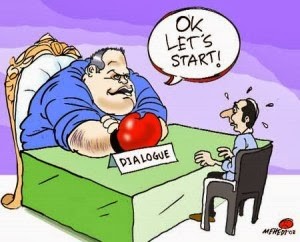 In 1997, managers at Samsung didn’t question a $13 billion investment that would take the company into the automobile industry because the idea’s champion, Samsung Chairman and CEO Kun-Hee Lee, was a forceful personality and a car buff. When Samsung Motors folded only a year into production, Lee wondered why no one had expressed reservations. (Teams That Click, HBSP, pg. 74)
In 1997, managers at Samsung didn’t question a $13 billion investment that would take the company into the automobile industry because the idea’s champion, Samsung Chairman and CEO Kun-Hee Lee, was a forceful personality and a car buff. When Samsung Motors folded only a year into production, Lee wondered why no one had expressed reservations. (Teams That Click, HBSP, pg. 74)
Robust dialogue could have prevented Samsung’s debacle.
Simply stated, robust dialogue occurs in a group when everyone is encouraged, allowed, and even required to give their unfiltered input on issues. The value of robust dialogue is: Every idea or plan will be improved upon when submitted to the unfiltered wisdom and input of others.
Robust dialogue is not just the right thing to do; it is the best thing to do. It’s not just politically correct, it is practically helpful.
The prelude to robust dialogue may sound like this:
-
-
- The boss says, “I’ve got an idea and I would really value everyone’s input. I want you to be totally honest.”
- A team member says, “My division is thinking about offering a new service, but before we get very far down the road, I want to get your opinion on the project.”
- A team member says, “I think we’re going in the wrong direction on this project.”
-
Bossidy and Charan teach that robust dialogue is based on openness, candor, and informality.
-
-
- Openness—people are not trapped by preconceptions; they’re open-minded.
- Candor—people speak candidly and express their real opinions. Truth is valued more than harmony.
- Informality—informal dialogue invites questions, mental experimentation, and creative and critical thinking. Formality suppresses dialogue and leaves little room for debate.
(Execution: The Discipline of Getting Things Done, pg. 102)
-
Robust dialogue will help maintain a transparent and healthy workplace. It’s amazing how often there’s an elephant in the room, but no one is willing to acknowledge it. Clarke and Crossland warn, “Every time your team avoids the critical ‘real issues,’ you lose. Every time the discussion outside the meeting room—physical or virtual—is dramatically different from the discussion inside the room, you lose.” (The Leader’s Voice, pg. 118)
Often, we avoid challenging dialogue because we value unanimity and harmony. But when we ignore the tough issues, we inadvertently dilute any sense of consensus; true alliance is achieved only when all the major issues have been identified and wrestled with. Consensus is good, unless it is achieved too easily, in which case it becomes suspect.
Robust dialogue is not only helpful in the workplace, it will also improve dialogue among family members and friends. See a previous post – Don’t go to Abilene — for an example of how robust dialogue might help family communications.

You are describing the gold standard in leadership, and it does start at the top. We’ve all known leaders oblivious of—or unwilling to see—their weaknesses. The emperor has no clothes, but no one has the guts to say so. In such an insecure environment, many people prefer to let the king continue the charade rather than to speak up and lose their heads. Those who do speak their minds, even graciously, are deemed no longer a “good fit.”
Thanks, Wayne, for taking the time to respond. It’s the plague of organizations; an insecure leader who discourages feedback. Thanks for our friendship.
Don, great post – thank you! I don’t think the link to “Don’t Go To Abilene” is working.
Sorry about that. Thanks for telling me. It’s fixed. Here’s the link: https://donmcminn.com/?s=don%27t+go+to+abilene
Well said!
Thanks, Gail.
I’ve worked with folks who persistently suggest radical changes in organizational methods, not because such changes would be worthwhile and valuable in the long term, but because of what I call their “burn it to the ground and start over” mentality. I don’t pretend to know what sparks such a mentality, but I’ve come to realized we must consider the the mentality of source as well as their recommendations. And sometimes such folks are right, and you are grateful to have someone that courageous; but more often their suggestions are perhaps too short-sighted and without the ultimate goals of the organization in mind.
Thanks, Perry, for taking the time to respond. You bring up a good point: what if people’s opinions and suggestions are off based and wrong. Sometimes a leader needs to ignore what someone says, or at least present it to the group for further discussion. But I think most leaders err on the side of not asking for input. Take care, Don.